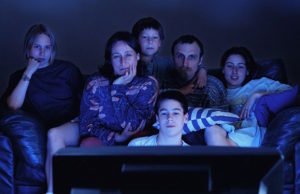Idol Thoughts
Written in 2007 and, as far as I can tell, previously unpublished. I get to bring one of my boyhood heroes, anthropologist Ashley Montagu, into a discussion of a talent game show.
Let us now praise cheesy television shows. “American Idol” has done what preachers, prognosticators and pundits have been unable to do – bring families together.

Families rarely dine en masse or attend church or do much beyond grunting at each other passing in the hall. But for half the year, families gather on Tuesday and Wednesday nights for this Velveeta-like testament to the enduring weirdness of American popular culture.
Since its launch in June 2002, the show has become either an obsession or a guilty pleasure for viewers. It is a titanic marketing force and perhaps even a force of evil. But whatever it is, it’s got the demographic that makes advertisers wobbly with excitement.
 For those of you just in from Neptune: “American Idol” holds cattle-call singing auditions across the country each fall. Three judges – acerbic Brit Simon Cowell, perky Paula Abdul and aging hipster Randy Jackson – sift through thousands of no-talents and eventually end up with a group of 24 fairly decent singers. After further screening, the group is cut even more and then viewers vote by phone, and each week on live television a new contestant’s hopes and dreams are crushed. (What fun.) During these final stages of competition, the singers perform classic rock, soul and pop tunes – often tutored by major recording artists – and when the winner is finally declared, he or she is forced to sing the worst song written in America that year. (Seriously: Taylor Hicks won the 2006 competition by channeling Otis Redding soul, then had to record a piece of jejune rubbish guaranteed to make your fingernails hurt.)
For those of you just in from Neptune: “American Idol” holds cattle-call singing auditions across the country each fall. Three judges – acerbic Brit Simon Cowell, perky Paula Abdul and aging hipster Randy Jackson – sift through thousands of no-talents and eventually end up with a group of 24 fairly decent singers. After further screening, the group is cut even more and then viewers vote by phone, and each week on live television a new contestant’s hopes and dreams are crushed. (What fun.) During these final stages of competition, the singers perform classic rock, soul and pop tunes – often tutored by major recording artists – and when the winner is finally declared, he or she is forced to sing the worst song written in America that year. (Seriously: Taylor Hicks won the 2006 competition by channeling Otis Redding soul, then had to record a piece of jejune rubbish guaranteed to make your fingernails hurt.)
The simple, durable format is the latest mutation of “Arthur Godfrey’s Talent Scouts,” part of early television’s basic DNA. The “American Idol” season finale, during which the winner is crowned, is apparently viewed by everything with eyeballs on Planet Earth.
Everybody watches the show. My three little boys would watch if it wasn’t past bedtime. My 80-year-old mother watches. In my house, my 10- and 20-year-old daughters watch, as does my 30-year-old wife (obviously not the mother of the 20-year-old). At work, my 50-year-old self holds morning-after debriefings with two work buddies – Ted Spiker, who is 40, and Mike Foley, who is 60. If I could find a 70-year-old fan, we’d have eight decades of viewers represented.
The show is a billion-pound jackhammer tunneling into the strata of society, pushing deep into our collective consciousness. Could be we’re excavating to the heart of the American Dream. That dream used to be about hard work and achievement and the eventual triumph of goodness. Now it’s just about the delirious pursuit of fame.

But maybe our fascination with “Idol” also shows an ugly side to our character. Perhaps we watch because we like the unending parade of tone-deaf losers in the early rounds. These people are obviously deranged, monumentally untalented and perhaps psychotic. Do we watch them for the same reason we watch those gob-spitting morons on the Jerry Springer show? Do they validate us and give us comfort in knowing no matter how low we sink, we are still above that crowd jello-ing in the primordial ooze?
Hard to say. “American Idol” is definitely schizophrenic: we love it because it is so bad and we love it because it is so good.
“It’s got all the elements of sports,” Ted says. “You pick your favorite early on, you root for them, you want them to win. Kind of like football, except the contestants don’t get injured – at least, not physically.”
Mike agrees. “I think part of it is the vicarious thrill,” he says. “What would it be like to actually be in, to quote Mr. Cowell, the ‘competition’?”

Competition. Aye, there’s the rub. The most influential anthropologist of my youth (because he was so often on The Mike Douglas Show) was stiff-lipped British academic Ashley Montagu. When he published The American Way of Life in 1968, he slammed our culture – including the sacred cow of all 11-year-old lads, the Boy Scouts. He said the problem with us America is that we teach competition rather than cooperation. If we ever wanted to be cool – like, say, the British – then we’d better fight our competitive nature.
Wounded Webelo that I was, I still recognized that he was probably right about us. We love conflict. We especially love conflict when we’re not involved. Watching these kids sing their hearts out each week then standing psychologically naked for judgment by the mouth-breathing masses – hell, does it get any better than that?
“I like to see the really bad people in the beginning of the show,” says Savannah, my 10-year-old. “I love to laugh at them.”
Mary, my 20-year-old, likes the music but loves the competition. “At the end of the season, it’s great to know you picked the winner early on,” she says. Mary got us hooked on the show the first season and pegged Kelly Clarkson as the winner from the get-go.
Watch the show and learn about the state of our union. There are performances in the early round so ghastly you feel the need to self-sterilize, making a symbolic effort to end propagation of a species capable of sounds so revolting. And yet when judges Simon, Randy and Paula say they aren’t good enough to continue, the contestants refuse to take responsibility for sucking. Apparently, even the colossally untalented feel entitled to fame and tabloid celebrity.
It is fun to watch the weekly competition. As I debrief with my middle-aged buddies each week, we analyze every vocal inflection, second-guess the performers and judge the quality of host Ryan Seacrest’s asides. (Good more often than not.).
Everyone has an opinion. “’American Idol’ is kind of like a Jolly Rancher,” my wife says. “Everyone has their favorite. You’ll eat the other ones, but you savor your favorite flavor.” (She was a Taylor Hicks fan from the start and can’t wait for his second CD, when he gets free from the “American Idol” contract that mandates the winner record a bland album under the show’s production deal.)
The happiest man in America during the show’s May 23 finale was Blake Lewis, who lost to Jordin Sparks. Losing meant he wouldn’t be stuck singing the crappy new “Idol” song and that after his indentured servitude with the “Idol” Top 10 tour – in town this week – he can go off and make music on his own.
 By then it will be time for families to gather in front of their television hearths again. Terry Sollazzo, a Tampa high-school teacher, looks forward to another season. She watches with her 11-year-old son, Scott. “It’s our special time together each week,” she says.
By then it will be time for families to gather in front of their television hearths again. Terry Sollazzo, a Tampa high-school teacher, looks forward to another season. She watches with her 11-year-old son, Scott. “It’s our special time together each week,” she says.
My daughter Mary will be back at college, where she and her roommates will pick apart the performances. We might allow the 5-year-old to stay up a little later this year to watch the show with mom and pop and big sister Savannah. During commercial breaks, we’ll break it down long-distance with mom, and the next day, my middle-aged buddies and I will have our note-by-note debriefings over coffee, giggle over the latest contestant faux pas and try to hold our heads high and call ourselves real men.
